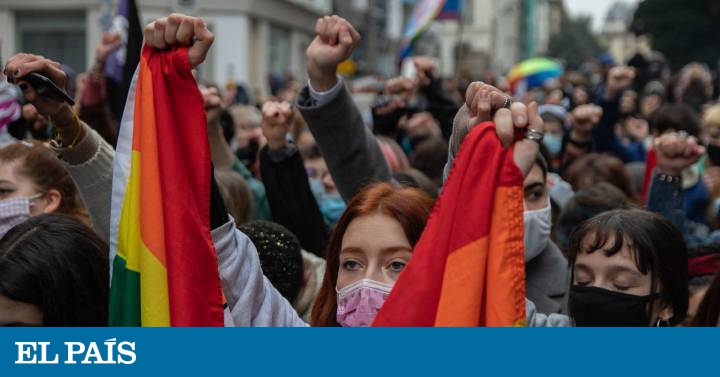MORE INFORMATION
Five cities in Africa with Lgtbiq rights
The world capital of LGTB rights
How many people does it benefit?
That changes?
Questions and answers about 'trans law'
The 'trans law' opens a new gap between PSOE and United We Can in the Government
The urban space has been the area on which LGTBI neighborhoods have been created in Europe since the last decade of the 20th century, configuring specific urban spaces that meet the three qualities established by Adler, S. and Brenner, J. in 1992 for territorial confirmation: visibility (shops, businesses and organizations), community activity (fairs, celebrations in the street), and organization of residents and businessmen in relation to the city government, in what some scholars called "liberated zones "of prejudice and LGTBI phobia.
And it is this same urban space that is becoming a new battlefield in the defense of equality and non-discrimination.
The initiative "zones free of LGTBI ideology", promoted by the ultraconservative Polish Government of Law and Justice together with a good part of the hierarchy of the Catholic Church in this country, has the support of more than a hundred Polish cities and municipalities.
This homophobic campaign has been harshly criticized by Brussels, which considers it unacceptable and the president of the Commission, Ursula von der Leyen, has emphatically pointed out that "it will not tolerate more violations of the rule of law" in Poland and that "LGTBI-free zones they are zones free of humanity and have no place in the EU ", while it has caused the withdrawal of community aid to at least eight Polish municipalities that have declared themselves" free of homosexual ideology "for failing to comply with the norms and values of the Union European.
The use of urban space as a new setting for the crusade undertaken by the Polish authorities against the human rights of lesbian, gay, transsexual, bisexual and intersex people has generated a rapid response from the European institutions, which have not hidden their deep concern for Initiatives that seek to veto LGTBI people in public space, generating an effect of harassment and criminalization of sexual orientations and identities.
The placement of visible signs at the entrances to these towns where you can read in different languages "LGTBI free zone" is too reminiscent of the ignominious "Jewish free zones" during the Nazi regime.
Despite the fact that the populations that have joined this initiative, being important in number, are small in population, and that the effects of this initiative on the free movement of citizens in them is of zero scope, the objective they pursue is harassment towards this group, establishing prejudice and discrimination.
However, its promoters have the clear intention of extending the initiative to other major cities in the country and nearby Hungary, whose ultra-conservative government has long led its own homophobic crusade.
Faced with this escalation, the European Commission has just presented its first Strategy for the Equality of Lesbian, Gay, Bisexual, Transsexual, Non-binary and Queer (LGTBIQ) people of the European Union.
A Strategy considered as a firm response by the European Commission to protect the LGTBI population against the significant decline in rights and freedoms of this group in Poland and Hungary.
The Strategy aims to address the inequalities and challenges these people face through a series of legal and financial measures for the next five years.
With this initiative, the Commission takes another step towards the common objective of a European Union that is not only built on the opening of borders or a common economy, but on equal fundamental values and rights for all citizens, who must be respected by the governments of all member states.
Unfortunately fear, violence and discrimination continue to be a reality that many LGTBI people face in much of the world, even being murdered, as the
Heroes of Today
campaign reminds us
through the short film 'Intoleranceisstillthere', which reminds us that intolerance continues here through the footballer and LGTBI activist Julio Cesar Zúñiga, who was murdered for being homosexual in Mexico in 2017. Even in those countries and regions that we consider ourselves to be at the forefront of LGTBI rights, discrimination and violence is still present too often.
With the new LGTBIQ Strategy, the European Commission wants to advance the equality of these people throughout Europe and end the discriminatory initiative "LGTBI-free zones" because, as it well remembers, the human rights of these citizens are not an ideology and their protection and protection are a priority for the European institutions.
Miguel Ángel Fernández
is executive director of the Pedro Zerolo Foundation, an LGTBI activist, has been general coordinator of Lambda Valencia and general secretary of the State Federation of Lesbians, Gays, Trans and Bisexuals (FELGTB) and in 2003 he participated in the National Work Group of the European Commission in Spain for the implementation of Directives 2000/43 on equal treatment due to racial or ethnic origin and 2000/78 on equality in employment and occupation.

